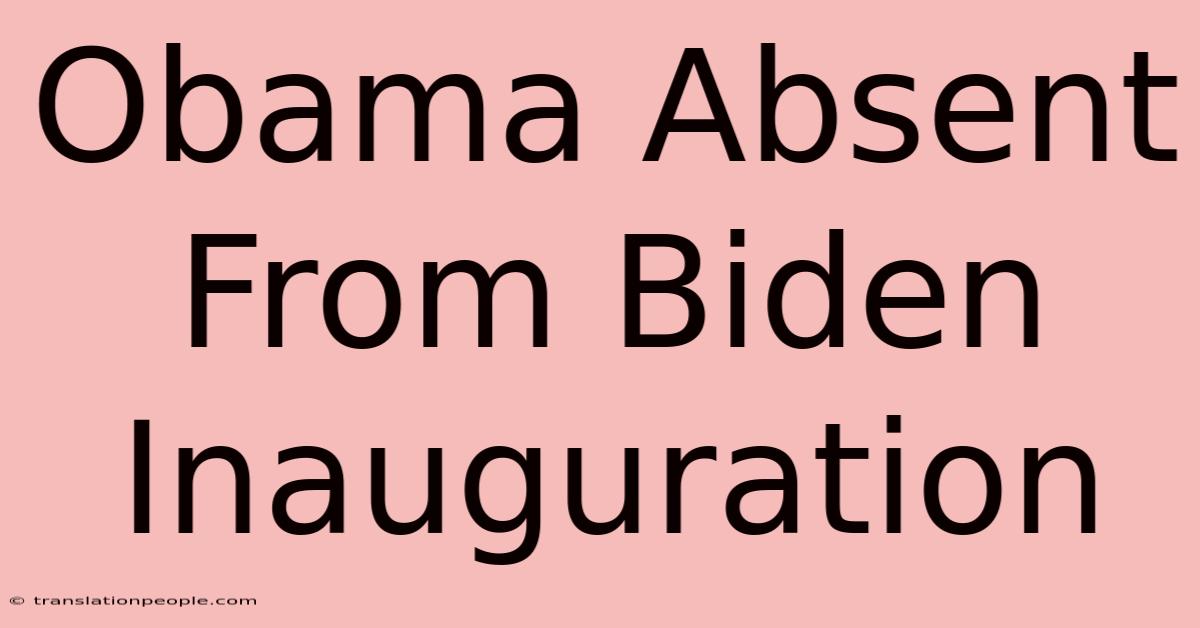Obama Absent From Biden Inauguration

Discover more detailed and exciting information on our website. Click the link below to start your adventure: Visit Best Website nimila.me. Don't miss out!
Table of Contents
Obama Absent From Biden Inauguration: A Surprise Omission?
Editor’s Note: Former President Barack Obama's absence from President Biden's inauguration has sparked considerable discussion. This article delves into the reasons behind this notable omission, exploring the historical context and potential implications.
Why This Matters
Barack Obama's absence from Joe Biden's inauguration is a significant event, defying the usual tradition of former presidents attending the swearing-in ceremony of their successors. This event carries weight for several reasons: it breaks with established protocol, raises questions about the state of the Democratic party's internal dynamics, and offers a unique lens through which to examine the evolving relationship between former and current administrations. The speculation surrounding Obama's absence is fueling conversations about political transitions, party unity, and the legacy of the Obama-Biden era. Understanding the context surrounding this event is crucial for grasping the nuances of contemporary American politics.
Key Takeaways
| Takeaway | Explanation |
|---|---|
| Unprecedented Absence | Obama's absence is a departure from historical precedent. |
| Speculation on Reasons | Various theories exist, ranging from scheduling conflicts to political considerations. |
| Impact on Democratic Party Unity | The absence may signal underlying tensions within the Democratic party. |
| Focus on Biden's Inauguration Itself | The event highlights the significance of Biden's presidency and its own narrative. |
Obama Absent From Biden Inauguration: A Deeper Dive
Introduction
The absence of former President Barack Obama from President Joe Biden's inauguration was a noticeable event, breaking with the long-standing tradition of former presidents attending the ceremony. While no official reason was given, the lack of Obama's presence has sparked considerable speculation and analysis.
Key Aspects
Several key aspects contribute to the significance of Obama's absence:
- Historical Precedent: Former presidents typically attend the inaugurations of their successors, signifying a peaceful transition of power and party unity. Obama's absence is therefore a notable deviation.
- Political Context: The event occurred against the backdrop of a highly charged political climate, marked by deep partisan divisions and ongoing controversies.
- Public Perception: The absence has inevitably led to public discussion and conjecture about the reasons behind it.
Detailed Analysis
The lack of a clear explanation for Obama's absence fuels various interpretations. Some suggest scheduling conflicts or personal commitments as potential factors. Others point to potential underlying tensions within the Democratic party, hinting at disagreements over policy or strategy. Still others speculate that the absence might be a calculated move, perhaps intended to avoid overshadowing Biden's inauguration or to maintain a carefully constructed public image. Analyzing these possibilities requires considering the complex relationships and power dynamics within the Democratic party.
The Role of Michelle Obama
While Barack Obama's absence was noted, the presence of Michelle Obama at the inauguration offers a counterpoint. Her attendance can be interpreted as a gesture of support for Biden, underscoring the continued importance of the Obama legacy within the Democratic party despite her husband's absence.
People Also Ask (NLP-Friendly Answers)
Q1: What is the significance of Obama's absence from Biden's inauguration?
A: Obama's absence breaks with long-standing tradition, raising questions about Democratic party unity and the relationship between former and current administrations. It's an unprecedented event with potential implications for political discourse.
Q2: Why is Obama's absence important?
A: It's important because it deviates from established norms, prompting analysis of potential underlying political tensions and the evolving dynamics within the Democratic party. It also shifts the focus of media coverage.
Q3: How could Obama's absence benefit Biden?
A: Arguably, Obama's absence could allow Biden to solely command the spotlight during his inauguration, establishing his own distinct presidency and avoiding the potential for comparisons or overshadowing.
Q4: What are the main challenges regarding Obama's absence?
A: The main challenge is the lack of clarity surrounding the reasons for his absence, leading to speculation and potentially harming the image of party unity.
Q5: How should the public interpret Obama's absence?
A: The public should interpret the absence cautiously, acknowledging that multiple factors may be at play and avoiding jumping to conclusions without further information.
Practical Tips for Understanding Political Transitions
- Seek Multiple Perspectives: Read analyses from various sources to gain a balanced understanding.
- Consider Historical Context: Examine past political transitions to draw comparisons and contrasts.
- Analyze Body Language and Statements: Pay close attention to subtle cues in official statements and appearances.
- Follow Reputable News Sources: Rely on credible sources for accurate information.
- Be Aware of Biases: Recognize that media outlets often present information with a particular slant.
- Engage in Critical Thinking: Don't accept information at face value; question assumptions and draw your own conclusions.
Summary
Obama's absence from Biden's inauguration is an unprecedented event with far-reaching implications. While the exact reasons remain unclear, the absence fuels discussions about political dynamics, party unity, and the evolving relationship between former and current administrations.
Call to Action
Share your thoughts on Obama's absence in the comments below! What do you think are the most likely reasons behind this unusual decision?
Hreflang Tags (Example - Adapt for all relevant languages)
<link rel="alternate" hreflang="en" href="https://www.example.com/obama-absent-biden-inauguration-en" />
<link rel="alternate" hreflang="es" href="https://www.example.com/obama-absent-biden-inauguration-es" />

Thank you for visiting our website wich cover about Obama Absent From Biden Inauguration. We hope the information provided has been useful to you. Feel free to contact us if you have any questions or need further assistance. See you next time and dont miss to bookmark.
Featured Posts
-
Executive Order Birthright Ends
Jan 21, 2025
-
Gulf Of Mexico Renamed America
Jan 21, 2025
-
Birthright Citizenship Trumps Power
Jan 21, 2025
-
Tech Ceos Attend Trumps Meeting
Jan 21, 2025
-
Dodgers Spending Spree Continues
Jan 21, 2025
